Tulips, with their vibrant colors and elegant forms, brighten up many gardens and homes. However, for cat owners, the beauty of these flowers comes with a crucial question: are tulips toxic to cats? The short answer is yes, but the level of toxicity and the resulting effects vary depending on several factors. This comprehensive guide will explore the dangers tulips pose to feline friends, offering essential information for responsible pet ownership.
What Parts of the Tulip Plant are Toxic to Cats?
All parts of the tulip plant—bulbs, stems, leaves, flowers, and pollen—contain toxins, primarily tulipalin A and tulipalin B. These compounds are glycosides, which are capable of causing irritation and more serious issues if ingested. While the bulbs generally contain the highest concentration of toxins, every part of the plant poses a risk. Even a small amount ingested can lead to problems.
What Happens if My Cat Eats a Tulip?
The severity of the reaction depends on several factors, including:
- Amount ingested: A small nibble might cause only mild symptoms, whereas consuming a large quantity of tulip parts can lead to more severe consequences.
- Sensitivity of the cat: Some cats are more sensitive to the toxins than others.
- Part of the plant ingested: Bulbs tend to have the highest concentration of toxins.
Common symptoms of tulip poisoning in cats include:
- Gastrointestinal upset: Vomiting, diarrhea, excessive drooling, and loss of appetite are common initial signs.
- Oral irritation: The cat may show signs of mouth irritation, such as pawing at its mouth or excessive licking.
- Skin irritation: Contact with tulip sap can cause skin irritation or dermatitis.
- Central nervous system depression: In severe cases, the cat might experience lethargy, weakness, or tremors. This is less common but warrants immediate veterinary attention.
Important Note: While rarely fatal, tulip poisoning can still cause significant discomfort and potential long-term health issues if left untreated.
How Can I Prevent My Cat from Eating Tulips?
Prevention is key when it comes to protecting your cat from tulip toxicity. Here are several strategies:
- Keep tulips out of reach: The simplest method is to avoid having tulips in your home or garden, especially if your cat has access to these areas.
- Plant deterrents: Consider planting cat-repelling plants near tulips to discourage your cat from approaching them.
- Supervise your cat: Closely supervise your cat's activities, especially when it's near tulips.
- Use deterrents: Commercial cat repellents are available and can be sprayed around tulips.
- Create barriers: Use fencing or other barriers to physically separate your cat from tulip plants.
What Should I Do if My Cat Eats a Tulip?
If you suspect your cat has ingested any part of a tulip plant, contact your veterinarian immediately. Do not wait for symptoms to develop. Providing information about the amount ingested, the type of tulip, and the time of ingestion will aid your veterinarian in providing the best course of treatment.
Your vet might recommend inducing vomiting or administering activated charcoal to help absorb the toxins. Early intervention significantly improves the chances of a full recovery.
Are all types of Tulips Equally Toxic to Cats?
While the level of toxicity may vary slightly between different tulip varieties, all types of tulips contain toxins that can harm cats. It's best to err on the side of caution and avoid all contact between your cat and any part of the tulip plant.
My Cat Only Touched a Tulip – Is That Harmful?
Even if your cat only touched a tulip, there's still a possibility of skin irritation from the sap. Keep a close watch for any signs of redness, swelling, or excessive licking in the area of contact. If you notice any unusual symptoms, consult your veterinarian.
This information is for educational purposes only and does not constitute veterinary advice. Always consult with a qualified veterinarian for any health concerns regarding your pet. The health and safety of your cat are paramount.
